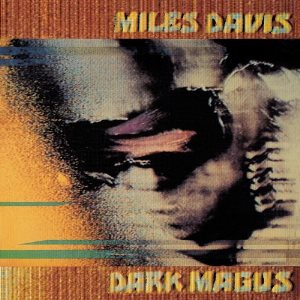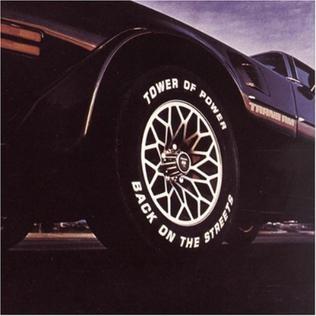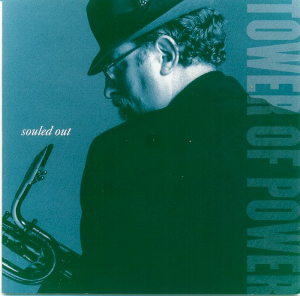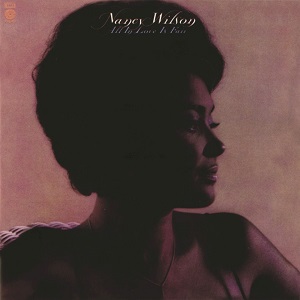
Funk is a music genre that originated in African-American communities in the mid-1960s when musicians created a rhythmic, danceable new form of music through a mixture of various music genres that were popular among African-Americans in the mid-20th century. It deemphasizes melody and chord progressions and focuses on a strong rhythmic groove of a bassline played by an electric bassist and a drum part played by a percussionist, often at slower tempos than other popular music. Funk typically consists of a complex percussive groove with rhythm instruments playing interlocking grooves that create a "hypnotic" and "danceable" feel. It uses the same richly colored extended chords found in bebop jazz, such as minor chords with added sevenths and elevenths, and dominant seventh chords with altered ninths and thirteenths.

Tower of Power is an American R&B and funk based band and horn section, originating in Oakland, California, that has been performing since 1968. There have been a number of lead vocalists, the best-known being Lenny Williams, who fronted the band between early 1973 and late 1974, the period of their greatest commercial success. They have had eight songs on the Billboard Hot 100; their highest-charting songs include "You're Still a Young Man", "So Very Hard to Go", "What Is Hip?", and "Don't Change Horses ".
Afro rock is a style of rock music with African influences. Afro rock is a dynamic interplay between Western rock music and African musical elements such as rhythm, melodies and instrumentation. Afro rock bands and artists in the late 1960s and early 1970s included Osibisa, Assagai and Lafayette Afro Rock Band.

John David Garibaldi is an American drummer best known for his work with the Oakland-based band Tower of Power. His playing style is considered a staple of funk music. Garibaldi’s drummer credits also include Natalie Cole, Jermaine Jackson, Boz Scaggs, Deniece Williams and Yellowjackets. Rolling Stone magazine ranked Garibaldi #46 on its list “100 Greatest Drummers of All Time”.

Emilio Castillo is an American saxophone player and composer, best known as the founder of the band Tower of Power.

T.O.P. is a 1993 album by the soul/funk group Tower of Power. It was the last album to feature founding trumpet player and band horn arranger Greg Adams and vocalist Tom Bowes. It also features a reunion with saxophonist Lenny Pickett, who shows up on a few tracks.

New Directions is the eighth and final studio album by the funk band the Meters, released in 1977. Produced by David Rubinson in California, it is the band's only album recorded outside New Orleans. The album features the Oakland-based Tower of Power horn section.

Man-Child is the fifteenth studio album by jazz pianist Herbie Hancock. The record was released on August 22, 1975 by Columbia Records. It was the final studio album to feature The Headhunters, and a number of guest musicians including saxophonist Wayne Shorter, a full brass section, three different guitarists, and Stevie Wonder on harmonica.

Maxwell's Urban Hang Suite is the debut album by American R&B singer-songwriter Maxwell. It was recorded in 1994 and 1995, then released on April 2, 1996, by Columbia Records.

East Bay Grease is the debut album by the soul and funk group Tower of Power, released in 1970. The band was one of the early music groups to be signed by Bill Graham's Fillmore Records, which released the LP.

Bump City is the second album by the soul/funk group Tower of Power. The album cover is derived from a sketch by David Garibaldi. It's also their first album for Warner Bros. Records. With Rufus Miller now gone, Rick Stevens took the reins as the sole lead vocalist for this album.

Soul Vaccination: Tower of Power Live is the second live album by the soul/funk group Tower of Power. It was recorded live in California during their 1998 world tour at two venues: The Fillmore in San Francisco and the Fox Theatre in Stockton.

Dark Magus is a live double album by the American jazz trumpeter, composer, and bandleader Miles Davis. It was recorded on March 30, 1974, at Carnegie Hall in New York City, during the electric period in Davis' career. His group at the time included bassist Michael Henderson, drummer Al Foster, percussionist Mtume, saxophonist Dave Liebman, and guitarists Pete Cosey and Reggie Lucas; Davis used the performance to audition saxophonist Azar Lawrence and guitarist Dominique Gaumont. Dark Magus was produced by Teo Macero and featured four two-part recordings, titled with the Swahili numerals for numbers one through four.

We Came to Play! is an album by the American band Tower of Power, released in 1978. It marked the debut of singer Michael Jeffries, who would stay with T.O.P. through the mid-1980s. Steve Cropper produced the album. It peaked at No. 89 on the Billboard 200.

Back on the Streets is an album by the American band Tower of Power, released in 1979. It was their last album with Columbia Records. The title derives from the song "Back on the Streets Again" from their debut album East Bay Grease. David Garibaldi returns to the drummer's spot a third time, only to leave after this album, again. It also marked the debut of bassist Vito San Filippo and guitarist Danny Hoefer. This would be Hoefer's only album as a member of Tower of Power.

Monster on a Leash is an album by the American band Tower of Power, released in 1991. It peaked at No. 19 on Billboard's Contemporary Jazz Albums chart.

Souled Out is a 1995 album by Tower of Power on Epic Records. It marked the debut of lead vocalist Brent Carter and drummer Herman Matthews, who, coincidentally, is a distant cousin of original TOP vocalist Rick Stevens. Founding member, baritone saxophone player Stephen "Doc" Kupka graces the front cover of the album. Jeff Lorber co-produced this album with band leader Emilio Castillo.

All in Love Is Fair is a studio album by American singer Nancy Wilson, released by Capitol Records in August 1974. It was her first album with producer Gene Page, who also did the arrangements and conducting and gave the album a more R&B-oriented sound. Musicians on the album include Ray Parker Jr., Wah Wah Watson, and Tom Scott. Marvin Gaye is also listed on the back cover as "The Phantom," with "warmest thanks." All in Love Is Fair includes one of the few songs co-written by Wilson.

Earth and Heaven is the debut album by the American band Repercussions, released in 1995. The album was recorded after the release of Groove Collective's debut album; the bands shared many members. The album was preceded by "Let's Do It Again", with Curtis Mayfield, which appeared on A Tribute to Curtis Mayfield.















